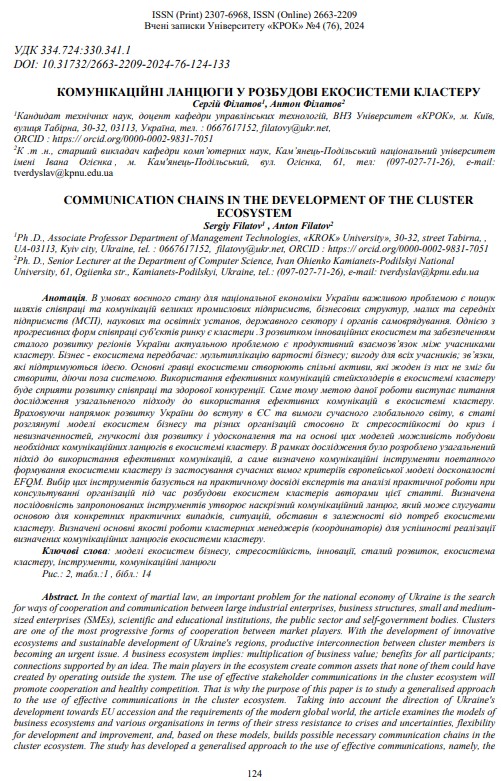COMMUNICATION CHAINS IN THE DEVELOPMENT OF THE CLUSTER ECOSYSTEM
DOI:
https://doi.org/10.31732/2663-2209-2024-76-124-133Keywords:
комунікаційні ланцюги , stress resistance, adaptive innovation policy, sustainable development, cluster ecosystem, tools, communication chainsAbstract
In the context of martial law, an important problem for the national economy of Ukraine is the search for ways of cooperation and communication between large industrial enterprises, business structures, small and medium-sized enterprises (SMEs), scientific and educational institutions, the public sector and self-government bodies. Clusters are one of the most progressive forms of cooperation between market players. With the development of innovative ecosystems and sustainable development of Ukraine's regions, productive interconnection between cluster members is becoming an urgent issue. A business ecosystem implies: multiplication of business value; benefits for all participants; connections supported by an idea. The main players in the ecosystem create common assets that none of them could have created by operating outside the system. The use of effective stakeholder communications in the cluster ecosystem will promote cooperation and healthy competition. That is why the purpose of this paper is to study a generalised approach to the use of effective communications in the cluster ecosystem. Taking into account the direction of Ukraine's development towards EU accession and the requirements of the modern global world, the article examines the models of business ecosystems and various organisations in terms of their stress resistance to crises and uncertainties, flexibility for development and improvement, and, based on these models, builds possible necessary communication chains in the cluster ecosystem. The study has developed a generalised approach to the use of effective communications, namely, the communication tools for the gradual formation of a cluster ecosystem using the modern requirements of the criteria of the European EFQM excellence model. The choice of these tools is based on the practical experience of experts and analysis of practical work in advising organisations on the development of cluster ecosystems by the authors of this article. The defined sequence of the proposed tools forms a cross-cutting communication chain that can serve as a basis for specific practical cases, situations, circumstances, depending on the needs of the cluster ecosystem. The main qualities of cluster managers (coordinators) for the successful implementation of the defined communication chains of the cluster ecosystem are identified
Downloads
References
Михайловська О. (2014). Регіонально-кластерна політика у розвитку світової економіки. Регіонально-кластерна політика у розвитку світової та української економіки : матеріали Міжнар. наук. - практ. конф., 24-25 квітня 2014 р. Чернівці: ЧТЕІ КНТЕУ, С. 58-61.
Юрчак О. Технологічні екосистеми та роль кластерів в їх створенні та керуванні. СЕО УКА. Доступ через: https://www.clusters.org.ua/blog-single/tech-ecosystems-and-cluster-role-in-their-orchestration.
Strategic Approaches to the Development of ComplexOrganisational Ecosystems: The Case of Lithuanian Clusters. Kristina Grumadait˙e and Giedrius Juceviˇcius. (2022). Доступ через: https://www.mdpi.com/2071-1050/14/23/15697 .
Войнаренко М. П., Л. А. Богатчик (2014). Використання кластерного інструментарію при розробці субрегіональних стратегій підвищення конкурентоспроможності економіки регіонів. Актуальні проблеми економіки. № 8 (158). С. 171–182.
Кузьмін О. Є., Саталкіна Л. О. (2013). Кластери як важливий чинник залучення інвестицій на промислові підприємства . Бізнесінформ. № 4. С. 127–134.
Крайник О. П. (2012). Напрями державної регіональної кластерної політики / Харківський регіональний інститут державного управління Національної академії державного управління при Президентові України. Доступ через: https://www.kbuapa.kharkov.ua/e...5/2012_05.pdf .
Підприємницька екосистема: що це таке та чому це важливо? Колонка Лідії Пащук, президента фонду K. Fund. Доступ через: https://ufuture.com/uk/pidpriyemnitska-ekosistema-shho-tse-take-ta-chomu-tse-vazhlivo-kolonka-lidiyi-pashhuk-prezidenta-fondu-k-fund.
Гребешкова О. М. (2009). Емерджентність у стратегічному процесі підприємства. Формування ринкової економіки. Зб. наук. праць. КНЕУ . Вип. 22. С. 129–137.
Федоренко В. Г., А. М. Тугай, А. Ф. Бойко та ін. (2008). Концепція кластерної політики в Україні. Економіка та держава. № 11. С. 5–15.
Європейські інноваційні екосистеми. Доступ через: https://horizon-europe.org.ua/uk/structure/pillars/p-3/eie/
Програма навчання та сертифікації тренерів «Стале та стійке підприємництво». Доступ через: https://bc-club.org.ua/events/sure.html /.
Модель EFQM. Доступ через: https://efqm.org/the-efqm-model / .
Тіщенко О. М. (2009) Кластери: ознаки, діагностика та формування. Проблеми економіки. № 4. С.21-28.
Бушуєв С. Д., Тихонович Ю. (2024). Менеджмент проектів сталого регіонального розвитку у турбулентному оточенні. Управління проектами у розвитку суспільства. Тема: «Управління проектами післявоєнної розбудови України» : тези доповідей ХХI Міжнар. конф., 24 травня 2024 р. Київ: КНУБА, С.70-75.

Downloads
Published
How to Cite
Issue
Section
License

This work is licensed under a Creative Commons Attribution-NonCommercial 4.0 International License.

